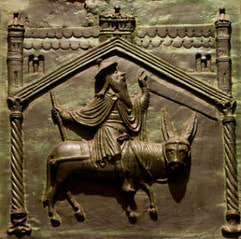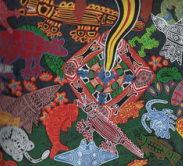
Been interested in Balaam, mostly because of the donkey and angel. See below for a post of my sermon on this.
As I prepared, I learned more about Balaam.
Who is Balaam? A mesopotamian soothsayer who “sees” into the future, usually through dreams. But is he a sorcerer or a diviner? Sorcery, or keshafim, was banned and punished by death in Israel (Deut 18:10). In Mesopotamian law, it is also a capital crime. Divination, nahash, involved reading omens, casting lots, interpreting oil or water, was practiced by the Levite priests who threw the urim and thurim. Balaam is considered nahash (23:23, 24:1) and kesem (22:7, 23:23). This form of divination could be tolerated in Israel since it wasn’t incompatible with monotheism.
Hackett writes that "Balaam is a diviner, a form of intermediary apparently acceptable in court circles in preexilic Judah.... a typical Yahweh-prophet, one who can only speak the word that Yahweh puts in his mouth, a phrase reflecting the paradigmatic description of a prophet in Deut 18:18.” ( Hackett, 1992, p 569).
But Balaam is more than a mouthpiece for the Israelite god. The Book of Balaam is a set of plaster inscriptions of Aramaic/ Canaanite dated 800 BCE. It was discovered at Tell Deir ˁAllā, on the Ammonite site of the Jabbok River in the late 1960s. He is a “seer of the gods” (ḥzh ˀlhn). Here is an excerpt of Balaam's visions (or Bileam).
The gods came to him at night.
And he beheld a vision in accordance with El's utterance.
They said to Balaam, son of Beor:
"So will it be done, with naught surviving.
No one has seen [the likes of] what you have heard!"
Balaam Reports his Vision to His Intimates.
Balaam arose on the morrow;
He summoned the heads of the assembly to him,
And for two days he fasted, and wept bitterly.
Then his intimates entered into his presence,
and they said to Balaam, son of Beor,
"Why do you fast, and why do you weep?"
Then he said to them: "Be seated, and I will relate to you what the Shaddai gods have planned,
And go, see the acts of the god!"
Balaam Describes the Celestial Vision and Its Aftermath in the Land
"The gods have banded together;
The Shaddai gods have established a council,
And they have said to [the goddess] Shagar:
'Sew up, close up the heavens with dense cloud,
That darkness exist there, not brilliance;
Obscurity and not clarity;
So that you instill dread in dense darkness.
And - never utter a sound again!'
It shall be that the swift and crane will shriek insult to the eagle,
And a nest of vultures shall cry out in response.
The stork, the young of the falcon and the owl,
The chicks of the heron, sparrow and cluster of eagles;
Pigeons and birds, [and fowl in the s]ky.
And a rod [shall flay the cat]tle;
Where there are ewes, a staff shall be brought.
Hares - eat together!
Free[ly feed], oh beasts [of the field]!
And [freely] drink, asses and hyenas!"
Nonetheless, let us return to the Hebrew Balaam. He arrives at a critical point at the end of Numbers, which can be organized like this:
(1) Israel in the Desert of Sinai (1:1 – 10:10)
(2) From Sinai to Kadesh (10:11 – 12:16)
(3) In the Kadesh area (13:1 – 20:21)
(4) Detour to avoid Edom (20:22 – 21:35)
(5) Israel in the plains of Moab (22:1 – 36:13).
Oracles of Balaam (Numbers 22-24)
Balak, King of Moab is worried about the immigrant force of Israelies plowing through neighboring territories. Following protocol, he hires the seer Balaam to curse them. Balaam tells him he will consult El about this, so he dreams and El or YHWH tells him he can't curse the Israelites because they are blessed. Balaam says he can only do what El prescribes, so he can't curse the Israelites. Balak, increasingly agitated, thinks Balaam is bargaining for a higher divination fee. So he sends messengers a second time with more gifts. Balaam goes back to dreaming. He receives the same answer (no), but then El permits him to meet Balak if he repeats what El tells him to say.
The little story I love - his trip on the donkey and encounter with the angel is Chpts 22-24. Like the jewel in the egg, we have the story I will tell next.
References
Hackett, J.A., Balaam, Anchor Bible Dictionary, New York: Doubleday, 1992, 569-572.
Levine, B.A. "The Deir 'Alla Plaster Inscriptions", in: W.W. Hallo (ed.), Context of Scripture, vol.2 (2003), 140-145.
Oppenheim, A. L. The Interpretation of Dreams in the Ancient Near East, Philadelphia, 1956
Unger, M.F. Unger’s Bible Dictionary, 3rd ed.; Chicago: Moody Press, 1966, 799.
See this collection of dreams in the bible
As I prepared, I learned more about Balaam.
Who is Balaam? A mesopotamian soothsayer who “sees” into the future, usually through dreams. But is he a sorcerer or a diviner? Sorcery, or keshafim, was banned and punished by death in Israel (Deut 18:10). In Mesopotamian law, it is also a capital crime. Divination, nahash, involved reading omens, casting lots, interpreting oil or water, was practiced by the Levite priests who threw the urim and thurim. Balaam is considered nahash (23:23, 24:1) and kesem (22:7, 23:23). This form of divination could be tolerated in Israel since it wasn’t incompatible with monotheism.
Hackett writes that "Balaam is a diviner, a form of intermediary apparently acceptable in court circles in preexilic Judah.... a typical Yahweh-prophet, one who can only speak the word that Yahweh puts in his mouth, a phrase reflecting the paradigmatic description of a prophet in Deut 18:18.” ( Hackett, 1992, p 569).
But Balaam is more than a mouthpiece for the Israelite god. The Book of Balaam is a set of plaster inscriptions of Aramaic/ Canaanite dated 800 BCE. It was discovered at Tell Deir ˁAllā, on the Ammonite site of the Jabbok River in the late 1960s. He is a “seer of the gods” (ḥzh ˀlhn). Here is an excerpt of Balaam's visions (or Bileam).
The gods came to him at night.
And he beheld a vision in accordance with El's utterance.
They said to Balaam, son of Beor:
"So will it be done, with naught surviving.
No one has seen [the likes of] what you have heard!"
Balaam Reports his Vision to His Intimates.
Balaam arose on the morrow;
He summoned the heads of the assembly to him,
And for two days he fasted, and wept bitterly.
Then his intimates entered into his presence,
and they said to Balaam, son of Beor,
"Why do you fast, and why do you weep?"
Then he said to them: "Be seated, and I will relate to you what the Shaddai gods have planned,
And go, see the acts of the god!"
Balaam Describes the Celestial Vision and Its Aftermath in the Land
"The gods have banded together;
The Shaddai gods have established a council,
And they have said to [the goddess] Shagar:
'Sew up, close up the heavens with dense cloud,
That darkness exist there, not brilliance;
Obscurity and not clarity;
So that you instill dread in dense darkness.
And - never utter a sound again!'
It shall be that the swift and crane will shriek insult to the eagle,
And a nest of vultures shall cry out in response.
The stork, the young of the falcon and the owl,
The chicks of the heron, sparrow and cluster of eagles;
Pigeons and birds, [and fowl in the s]ky.
And a rod [shall flay the cat]tle;
Where there are ewes, a staff shall be brought.
Hares - eat together!
Free[ly feed], oh beasts [of the field]!
And [freely] drink, asses and hyenas!"
Nonetheless, let us return to the Hebrew Balaam. He arrives at a critical point at the end of Numbers, which can be organized like this:
(1) Israel in the Desert of Sinai (1:1 – 10:10)
(2) From Sinai to Kadesh (10:11 – 12:16)
(3) In the Kadesh area (13:1 – 20:21)
(4) Detour to avoid Edom (20:22 – 21:35)
(5) Israel in the plains of Moab (22:1 – 36:13).
Oracles of Balaam (Numbers 22-24)
Balak, King of Moab is worried about the immigrant force of Israelies plowing through neighboring territories. Following protocol, he hires the seer Balaam to curse them. Balaam tells him he will consult El about this, so he dreams and El or YHWH tells him he can't curse the Israelites because they are blessed. Balaam says he can only do what El prescribes, so he can't curse the Israelites. Balak, increasingly agitated, thinks Balaam is bargaining for a higher divination fee. So he sends messengers a second time with more gifts. Balaam goes back to dreaming. He receives the same answer (no), but then El permits him to meet Balak if he repeats what El tells him to say.
The little story I love - his trip on the donkey and encounter with the angel is Chpts 22-24. Like the jewel in the egg, we have the story I will tell next.
References
Hackett, J.A., Balaam, Anchor Bible Dictionary, New York: Doubleday, 1992, 569-572.
Levine, B.A. "The Deir 'Alla Plaster Inscriptions", in: W.W. Hallo (ed.), Context of Scripture, vol.2 (2003), 140-145.
Oppenheim, A. L. The Interpretation of Dreams in the Ancient Near East, Philadelphia, 1956
Unger, M.F. Unger’s Bible Dictionary, 3rd ed.; Chicago: Moody Press, 1966, 799.
See this collection of dreams in the bible

 RSS Feed
RSS Feed
